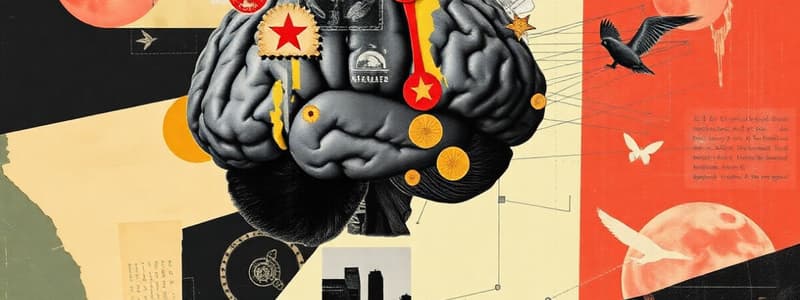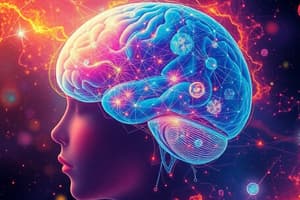Podcast
Questions and Answers
What is the minimum penalty for first-time offenders caught driving under the influence of alcohol?
What is the minimum penalty for first-time offenders caught driving under the influence of alcohol?
What are the potential legal consequences if a drunk driver causes the death of someone?
What are the potential legal consequences if a drunk driver causes the death of someone?
Which of the following is NOT listed as a harmful effect of marijuana use?
Which of the following is NOT listed as a harmful effect of marijuana use?
What substance in marijuana is primarily responsible for the drug's mind-altering effects?
What substance in marijuana is primarily responsible for the drug's mind-altering effects?
Signup and view all the answers
How long could a person risk losing their driver's license after being convicted of DUI?
How long could a person risk losing their driver's license after being convicted of DUI?
Signup and view all the answers
Which of the following statements about marijuana legalization is true?
Which of the following statements about marijuana legalization is true?
Signup and view all the answers
What impact can a DUI conviction have on future employment opportunities?
What impact can a DUI conviction have on future employment opportunities?
Signup and view all the answers
Why is CBD considered to have potential medical benefits?
Why is CBD considered to have potential medical benefits?
Signup and view all the answers
What is a potential social consequence of binge drinking?
What is a potential social consequence of binge drinking?
Signup and view all the answers
How does binge drinking affect physical coordination?
How does binge drinking affect physical coordination?
Signup and view all the answers
What long-term health risk is associated with excessive alcohol consumption?
What long-term health risk is associated with excessive alcohol consumption?
Signup and view all the answers
What is one of the psychological effects of binge drinking?
What is one of the psychological effects of binge drinking?
Signup and view all the answers
What is a common misconception about the immediate effects of consuming alcohol?
What is a common misconception about the immediate effects of consuming alcohol?
Signup and view all the answers
What is the definition of binge drinking?
What is the definition of binge drinking?
Signup and view all the answers
What is a potential consequence of drug use on personal relationships?
What is a potential consequence of drug use on personal relationships?
Signup and view all the answers
How does an early introduction to alcohol affect future alcohol dependence?
How does an early introduction to alcohol affect future alcohol dependence?
Signup and view all the answers
What percentage of all deaths worldwide is attributed to harmful use of alcohol?
What percentage of all deaths worldwide is attributed to harmful use of alcohol?
Signup and view all the answers
How much more likely are individuals who start drinking before age 15 to use marijuana?
How much more likely are individuals who start drinking before age 15 to use marijuana?
Signup and view all the answers
What is the primary effect of consuming two or more alcoholic drinks?
What is the primary effect of consuming two or more alcoholic drinks?
Signup and view all the answers
What legal consequence can occur if an individual is arrested for drunk driving and cannot post bail?
What legal consequence can occur if an individual is arrested for drunk driving and cannot post bail?
Signup and view all the answers
What can be a result of alcohol abuse in terms of road safety in South Africa?
What can be a result of alcohol abuse in terms of road safety in South Africa?
Signup and view all the answers
What is a prerequisite for driving under the influence of alcohol according to South African law?
What is a prerequisite for driving under the influence of alcohol according to South African law?
Signup and view all the answers
What is the maximum amount of time alcohol can remain in the bloodstream?
What is the maximum amount of time alcohol can remain in the bloodstream?
Signup and view all the answers
Which of the following factors can influence an individual's blood alcohol concentration (BAC)?
Which of the following factors can influence an individual's blood alcohol concentration (BAC)?
Signup and view all the answers
Which legal action must individuals take when arrested for drunk driving regarding a blood sample?
Which legal action must individuals take when arrested for drunk driving regarding a blood sample?
Signup and view all the answers
Study Notes
Life Orientation: Teenage Brain Development
- Brain development continues until mid-late twenties, leading teens to experiment and engage in risky behaviors.
- Prefrontal cortex, the last part of the brain to develop, is responsible for decision-making, risk assessment, consequence prediction, reasoning, and impulse control.
- Late development of the prefrontal cortex explains why teenagers may not fully consider risks and their consequences.
- Limbic (reward) system is extremely sensitive during teen years, rewarding pleasurable activities (e.g., drinking) leading to repetition.
Life Orientation: Mesolimbic Dopamine System
- Pleasure system, also known as the mesolimbic dopamine system, is responsible for feelings of pleasure and motivation.
- Drugs artificially stimulate the mesolimbic dopamine system, which explains their addictive nature.
Life Orientation: Reward Pathway
- Located in the brain's center, responsible for motivation, reward, and behavior.
- Crucial for survival-related activities like eating.
- Stores information about pleasurable activities (e.g., a delicious-looking cupcake).
- Releasing dopamine upon satisfying a desire (e.g., eating the cupcake), creating a pleasurable feeling that encourages repetition.
- Neurotransmitters are chemical messengers, while receptors receive these messages.
Life Orientation: Causes of Addiction
- Combination of biological, psychological, social, and environmental factors.
- Genetic predisposition plays a significant role (50%).
- Studies have shown a correlation between genes and how the body processes substances, affecting reward processing.
- Stress, anxiety, and trauma are significant psychological contributing factors.
- Surrounding oneself with substance users contributes to social factors.
- Availability and affordability of substances are environmental factors that affect substance abuse.
Life Orientation: Trauma and Addiction
- Trauma in various forms (neglect, abuse, loss) increases the risk of substance abuse.
- Trauma can lead to substance use to numb the pain.
- Seeking help from trusted adults and medical professionals is crucial for recovery.
Life Orientation: Stages of Addiction
- Experimentation: Initial use of a substance (e.g., trying alcohol at a party).
- Regular Use/Bingeing: Increased frequency and quantity of substance use.
- Problem/Risky Use: Difficulties arise due to substance use (e.g., affecting one's health, relationships, or school performance).
- Dependence: Inability to stop consuming even though it's harmful.
Life Orientation: Characteristics of Dependence
- Binge: Binge drinking, intoxication episodes.
- Withdrawal: Withdrawal symptoms, negative effects.
- Craving: Preoccupation, anticipation, inability to stop taking the substance.
- Impaired Control: Inability to control or stop substance use.
- Social Problems: Loss of interest in activities unrelated to substance use, broken relationships, and issues with school or work.
- Increased Risk-Taking: Risky behaviors associated with substance use.
Life Orientation: Effects of Chronic Drug Use
- Prolonged use changes the brain, leading to addiction.
- Individuals find it difficult to stop use even when they want to.
- Use has devastating effects on their lives.
Life Orientation: Binge Drinking
- Consuming excessive amounts of alcohol in a short period.
- Form of substance abuse.
- Defined as consuming five or more alcoholic drinks on one occasion.
- Alcohol is a depressant; excessive use can significantly impair function/health and safety.
Life Orientation: Liquid Courage
- Temporary boost in confidence made possible by alcohol.
- Users may act braver or less inhibited than they would normally.
- Potential for regretful actions.
Life Orientation: Health Risks of Binge Drinking
- Increased risk of injuries (accidental) due to impaired coordination.
- Risk of alcohol poisoning (brain damage and potentially death).
- Long-term damage to organs such as the liver and increased blood pressure.
Life Orientation: Behavior Associated with Addiction
- Poor Decision-Making: Impaired judgment leading to poor choices.
- Depression: Worsening of mental health instead of improvement.
- Humiliation: Lowered inhibitions leading to regrettable actions.
- Social Media Shame: Potential damage to reputation through social media activities.
Life Orientation: Legal Age Limits for Drinking
- Minimum legal drinking age in South Africa is 18 years old.
- Early use (before age 18) significantly increases the risk of developing alcohol dependence.
- Risks include illegal activities.
Life Orientation: Blood Alcohol Concentration (BAC)
- Percentage of alcohol in the bloodstream.
- Affected by factors such as gender, weight, and food.
- Moderate amounts act as stimulants; higher amounts have a depressant effect.
- Affects reaction time, motor skills, and concentration.
- Driving under influence is illegal in most countries.
Life Orientation: Consequences of a Drunk-Driving Arrest
- Possible imprisonment (up to six years).
- Substantial fines.
- Loss of driving license.
- Criminal record potentially impacting future opportunities.
- Legal consequences for accidents involving harm or death.
Life Orientation: Marijuana
- Common substance use.
- THC (tetrahydrocannabinol) causes mind-altering effects.
- Not considered safe; regardless of legal status.
- Contains over 400 chemicals including CBD.
- CBD has no intoxicating effects; medical applications are being researched.
- Smoking marijuana has significant negative impacts on lung health.
- Potentially damaging substance, even with legal status in South Africa.
Life Orientation: Social Media Addiction (Nomophobia)
- Not a substance; but a serious addiction.
- Negative impacts including depression and low self-esteem.
- Feelings of isolation, affecting daily life and relationships.
- Requires management and recognition as a disorder.
Life Orientation: Vaping
- Involves heating liquid (often with nicotine) to produce an aerosol.
- Aerosol may contain highly toxic chemicals.
- Risks include respiratory and heart diseases, cancer, and potentially addiction.
- E-cigarettes have differing ingredients; effects are not fully understood.
- EVALI is a lung disease linked to vaping.
- Associated with increased risk of a chronic lung disease.
Life Orientation: Ritalin and Adderall
- Prescription medications for ADHD (attention-deficit hyperactivity disorder).
- Used correctly under medical supervision, they can be helpful for concentration.
- Misuse or use without prescription can have harmful side effects.
- Classified as Schedule 2 narcotics.
Life Orientation: Understanding Addiction
- Teens are more vulnerable to addiction due to brain development (risk-taking behavior).
- Understanding that it is a complex illness, not a personal flaw.
- Using appropriate language is essential (e.g., substance use disorder instead of addiction).
Studying That Suits You
Use AI to generate personalized quizzes and flashcards to suit your learning preferences.
Related Documents
Description
Explore how the teenage brain develops and the effects on behavior. This quiz covers the roles of the prefrontal cortex and the mesolimbic dopamine system in decision-making and reward pathways. Understand why teens may engage in risky behaviors and the implications of brain chemistry.




